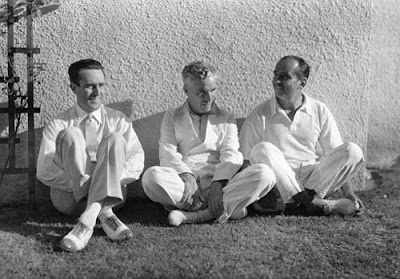The sad, sweet romantic: was ever a comedian more melancholy, more aware of the fragile depths of the human heart?
Intensity, asceticism, fierceness: do not mess with this Harold Lloyd.
The Barrymore profile, a reminder of his first ambition: to be a stage actor. And he never stopped looking like a leading man.
So much for the chaste peck we see at the end of most silent screen comedies. This kiss (with Jobyna Ralson, Why Worry?) sets the screen on fire!
Oh, mighty-my. Movie stars, on the town.
This man did nothing by halves. Harold didn't just have "a dog". He had a kennel full of Great Danes the size of small horses.
There is just something about the way he sits in mud. Has a style all its own.
Oh, Bebe! The energy of these two leaps across time.
(And note the gaze: he has what they used to call "bedroom eyes").
Would you trust this man with your girl friend?
Is he sitting in mid-air, on a magic carpet, or in a giant high chair? Even in a Brooks Brothers suit, he's Peter Pan.
Even Cary Grant never wore a tux this well. As they say in Nebraska: he cleaned up real nice.
The emotional climax of The Freshman: some idiot critic once said of Lloyd that he "lacked tenderness". It was one of those wildly inaccurate remarks that sticks like a burr. Whoever he was, I don't think he ever saw a single Harold Lloyd movie, and most definitely not this one.
Harold is never funnier than when committing suicide. Here he's taking poison in one of my personal favorites, Never Weaken; in Haunted Spooks he tries to shoot himself with a water pistol.
(By the way, did anyone ever stop to ask how Harold managed to extract humor out of such a dark subject? It's yet another example of his genius, so quicksilvery that if you blink you might miss it. I do not think his mind was operating at the same velocity as the rest of us.)
Without the white makeup and glasses, Harold was almost unrecognizable. He could go about incognito, and unlike most stars who want to be recognized, he believed it was a benefit to him and afforded him privacy.
I love this picture with Hal Roach: both of them look like youngsters. And that devastating flashbulb grin. But what's that weird halo doing above his head?
This, this, THIS is why women love Harold Lloyd, even now! In spite of all his good intentions he is always getting bruised and battered and humiliated. You want to take him home with you. In fact. . . you do.
No one courted with more delicacy.
Movie stars aren't like the rest of us. That's why they're movie stars.


























































